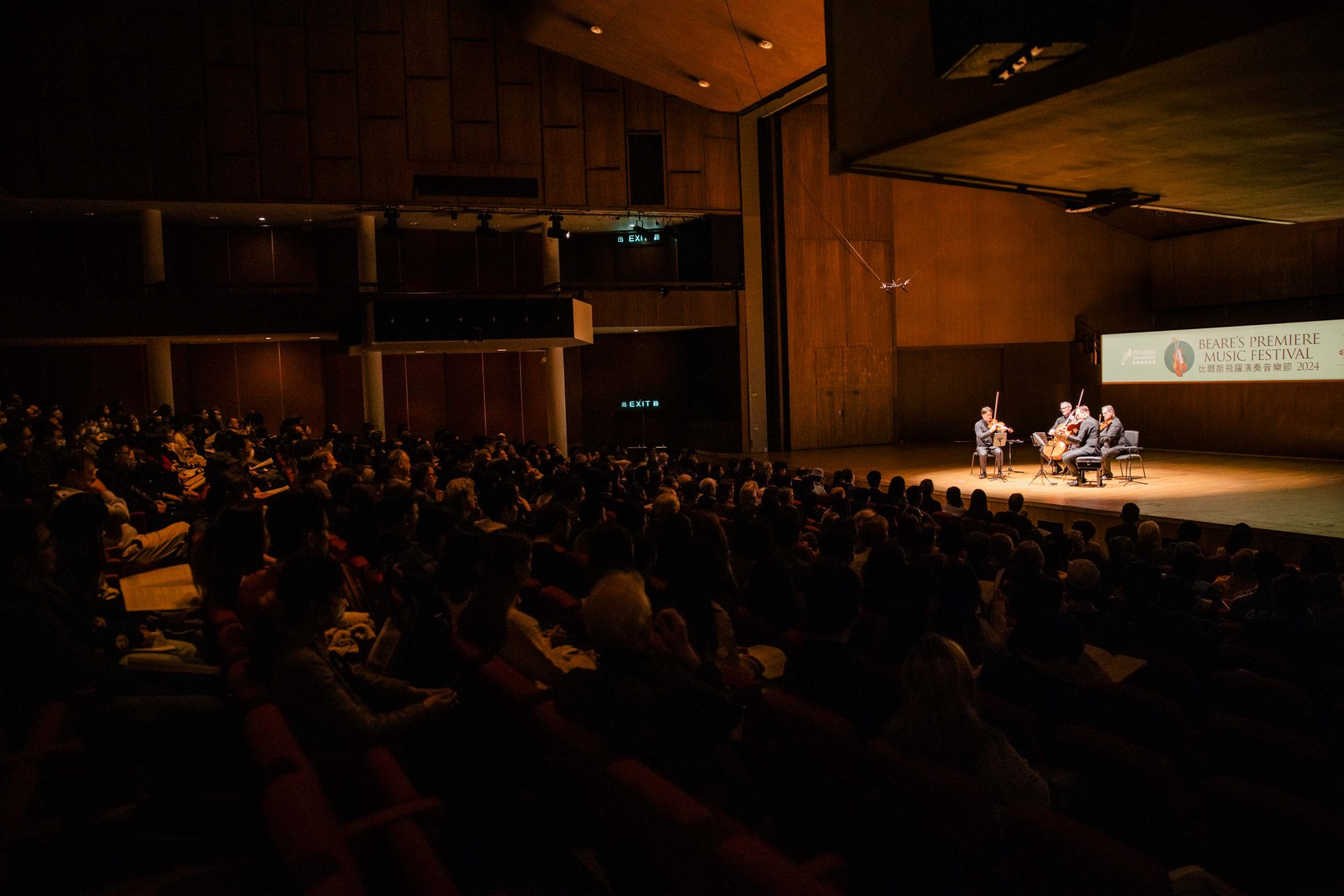Their playing preceded by short texts read in turn by the musicians, they launched the first programme of the 2024 Beare’s Premiere Music Festival, “Spotlight on the Miró Quartet”, in an unconventional, and beautiful, manner.
Clean, flute-like harmonics from first violinist Daniel Ching were passed along fluidly by the rest of the ensemble, and as the lushness of the sound developed, pizzicato passages began to pepper the score.
Gliding glissandos effectively depicted old photographs “smeared into focus one by one” before a chaotic summer storm with raindrops set in, symbolised by more pizzicato. That was followed by violinist William Fedkenheuer’s “3½” moment, prompted by the text, “Everyone was grateful to know which movement they were on!”
The “chord that fell from grace” was an arpeggio that was constantly interrupted and reset by each musician in a new tonality. The repetition was also reflected in the text in which painter Miró (and the quartet’s namesake) “noticed a bird repeating its solitary caption”.
Finally, crunched chords were slowly released into more mesmerising sounds, but inevitably, like all of the snippets that comprise Microfictions, they had little time to develop.
Japanese-Norwegian violist Masumi Per Rostad joined the quartet for a somewhat beefy, legato-laden rendition of Mozart’s String Quintet in G minor, KV 516.
5 conductors who could be the next HK Phil music director
5 conductors who could be the next HK Phil music director
Sameness in the sound and intensity of the vibrato worked against the music’s contrasts, and Ching’s use of portamento (or gliding) up to high notes was more liberal than the others and overdone on occasion.
After extracting much sorrow from the muted Adagio movement, relief came in the quintet’s rollicking finale that showed Mozart’s “operatic” style brilliantly.
The performance of Brahms’ String Quartet No 1 in C Minor, Opus 51 No 1 after the interval was epic, and justifiably brought the house down.
The celebrated quartet impressed greatly with a passionate and animated reading. They maintained dramatic tension throughout the opening Allegro, enchanted with hymn-like chordal movement in the Romanze, and showed great poise and elegance in the Allegretto. It culminated in a finale so emotionally explosive that occasional glitches in performance were irrelevant.
The second of Beare’s Premiere Music Festival concerts, aptly titled “The Genius of Mozart”, began with his Sonata for Two Pianos in D major, KV 448 composed when Mozart was 25.

It is hard to fathom that it was at that very age that Mozart entered his mature middle-to-late period.
Pianists Orion Weiss and Shai Wosner performed with uncanny unity. Their contrapuntal interplay was balanced to perfection and passed back and forth with ease and accuracy, bringing the opera-like intrigue of the opening to life.
As in the finest of vocal duets, the tender exchanges of Weiss and Wosner’s sublime grace notes and phrases were part and parcel of a dream-like Andante. Flawless articulation also marked the highly playful and cheeky finale.
‘I can’t stop these tears’: Chilean-Italian conductor’s musical journey
‘I can’t stop these tears’: Chilean-Italian conductor’s musical journey
Returning to City Hall for Mozart’s String Quartet No. 19 in C major, K 465 the Miró Quartet executed the “dissonance” (the work’s nickname) and its resolution in the opening Adagio-Allegro movement with great skill.
Their playing, noticeably lighter and more buoyant, featured crisp syncopation and a sensitive chug from Joshua Gindele’s cello along the way.
Delectably lyrical playing soared above a gently pulsating “bow vibrato” in the Andante cantabile, and first violinist Ching impressed often with subtle uses of rubato in the finale, even if his counterparts didn’t quite catch one of them.
Hong Kong string ensemble’s young soloist mesmerises in Arvo Pärt work
Hong Kong string ensemble’s young soloist mesmerises in Arvo Pärt work
The divertimento, usually pigeonholed as light classical entertainment, reaches ambitious heights in Mozart’s Divertimento in E-flat Major, KV 563 for string trio.
This soon became clear in the collaboration between Chengdu-born violinist Ning Feng, violist Per Rostad, and American cellist Gary Hoffman as they captivated listeners with an array of colour and emotion.
Feng’s affinity for Mozart was unmistakable. On his superb 1710 Stradivari, the agile Chinese violinist conjured sweet tones that were woven with sensitivity into the ensemble.
Per Rostad exuded confidence in the tricky viola part (which Mozart performed himself at the premiere), while Hoffman’s distinct cello sound rumbled warmly throughout.
The spirited finale was a fitting end to a night of gems, dotted with super-tight ricochet bowing, humour, and above all, full of respect for Mozart’s genius.
“Beare’s Premiere Music Festival – Spotlight on the Miró Quartet”, City Hall Concert Hall, Jan 15 and “Beare’s Premiere Music Festival – The Genius of Mozart”, City Hall Concert Hall, Jan 17.







